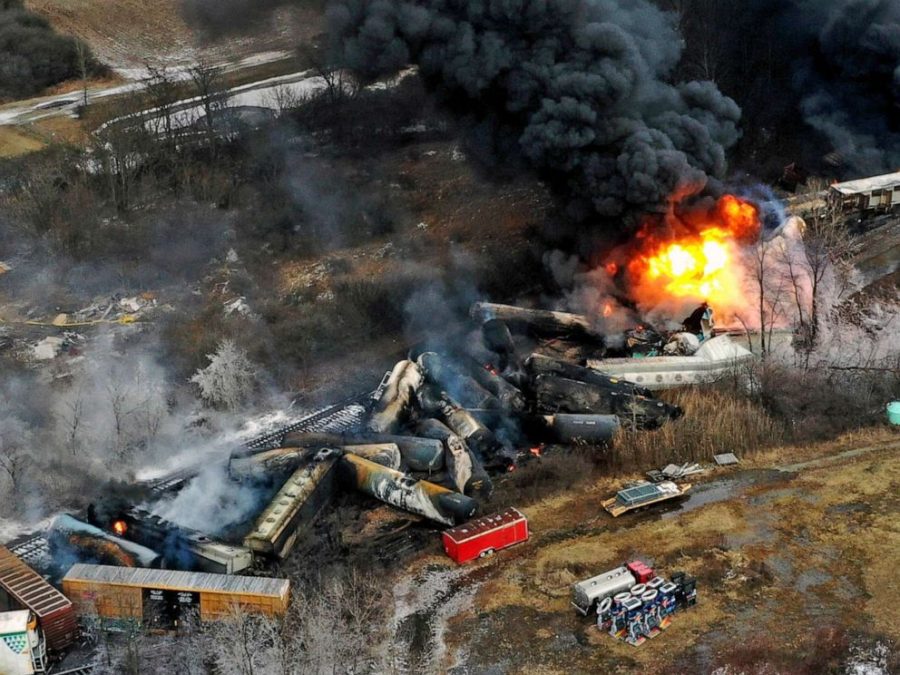The ongoing tragedy behind the train derailments
Like most Americans, when I heard about a massive train derailment occurring in Ohio, where multiple train cars contained highly combustible chemicals, I was sad and concerned for the locals and wildlife. Truly, I can’t imagine what it feels like for the people of East Palestine, who are just trying to live their lives and now have to deal with an environmental and community health disaster. Often, as a middle class American, I think it is easy to forget that most people in the world don’t wake up in neighborhoods or cities with extensive construction regulation, access to heating and clean water whenever they want, and the ability to safely use the bathroom within their own home. However, accidents like these remind us that despite all our precautions and knowledge, one simple mistake can still expose us to substances that could easily kill us. Accidents are a part of life, and we should always come together as a country afterwards in order to take care of those affected and rebuild their communities.
However, while I did feel concern and sadness when hearing about the tragedy, I cannot say I was shocked by this news. Maybe it’s the 24/7 news cycle, where homicides and natural disasters are projected into our homes every night. Maybe it’s the meltdown of Twitter causes singlehandedly by the richest person in the world, or the collapse of Bitcoin by a reckless twenty-something in the Bahamas. Corporate mismanagement and sheer stupidity by the entrepreneur crowd definitely doesn’t feel like it’s in short supply these days. The fact that Norfolk Southern, the rail carrier the derailed train was operated by, somehow bungled what on paper appears like a pretty normal job, fit neatly into the overall picture of 2022-2023.
Yet I can say that I was genuinely shocked that on March 9, the day Norfolk Southern’s CEO was due to testify before the U.S. Congress, the media reported on yet another train derailment from the company, this time in Alabama. On the surface it’s almost comical, a railroad boss, probably stressed out waiting to answer questions before the nation’s top lawmakers, finds out hours before his testimony that another one of his trains has just made headlines for falling off the tracks. It’s funny for a few seconds, but not if you hear that about 3 trains derail in the U.S. every day. It’s also not funny if you know how hard Norfolk Southern, and it’s fellow rail carriers, have fought common sense safety measures for years leading up to the derailment.
Since 2016, the rail industry workforce has been cut by roughly 30 percent, mostly among employees who inspect and ride along the locomotives to insure the safety of the cargo and the train on the trip. Within Norfolk Southern, workers have seen the time they have to inspect each car decrease by half, from 3 minutes to 90 seconds. That may seem fine, but keep in mind most trains carry 100 cars, and train cars are 100 feet long. In fact, trains today are approaching 2 miles long, but are staffed on average by two workers and a trainee. Workers have been expected to take on more tasks, in shorter amounts of time, in order for the companies to reduce labor costs and boost investor returns.
Additionally, the railroad industry and their allies in Washington have opposed meaningful rail safety updates for a decade. During the 2010s, Norfolk Southern lobbies successfully to repeal electronic braking requirements for freight trains carrying heavy and dangerous materials, after previously supporting and promoting the same brakes. Federal regulators have been reported to be lax about enforcing regulations for more than 10 years, and despite workers, customers, and executives themselves all agreeing the industry needs a major overhaul, no meaningful work has actually been done.
On top of this, Norfolk Southern is also refusing to pay for a cleaning of East Palestine, after they spilled dangerous chemicals in peoples’ literal backyards. The strategy among the industry for many years now has been to grow train length, reduce staff, and improve “efficiency,” and to oppose common sense rules and practices at every turn.
It’s time for the industry to change, and that starts with the investors and Wall Street taking a sideline and cooling their heads. Profits are important in business, but a railroad is not just a private business, in many ways it is a public service, and the safety of America’s communities, workers, and supply lines must come first. Modern regulations must be passed by Congress and properly enforced by regulators, among them modern braking systems, greater numbers of staff on each train, and more time for staff to conduct their inspections and other duties. It’s not hard to see how this crisis may be resolved, it will be solved when people decide common sense must come before the wild urge for more money.
References
https://time.com/6213399/railroad-strike-impact-trains/

Jonas is a senior who can’t wait for all the adventures and new experienced Journalism will bring. He is looking forward to conducting interviews, opinion...

